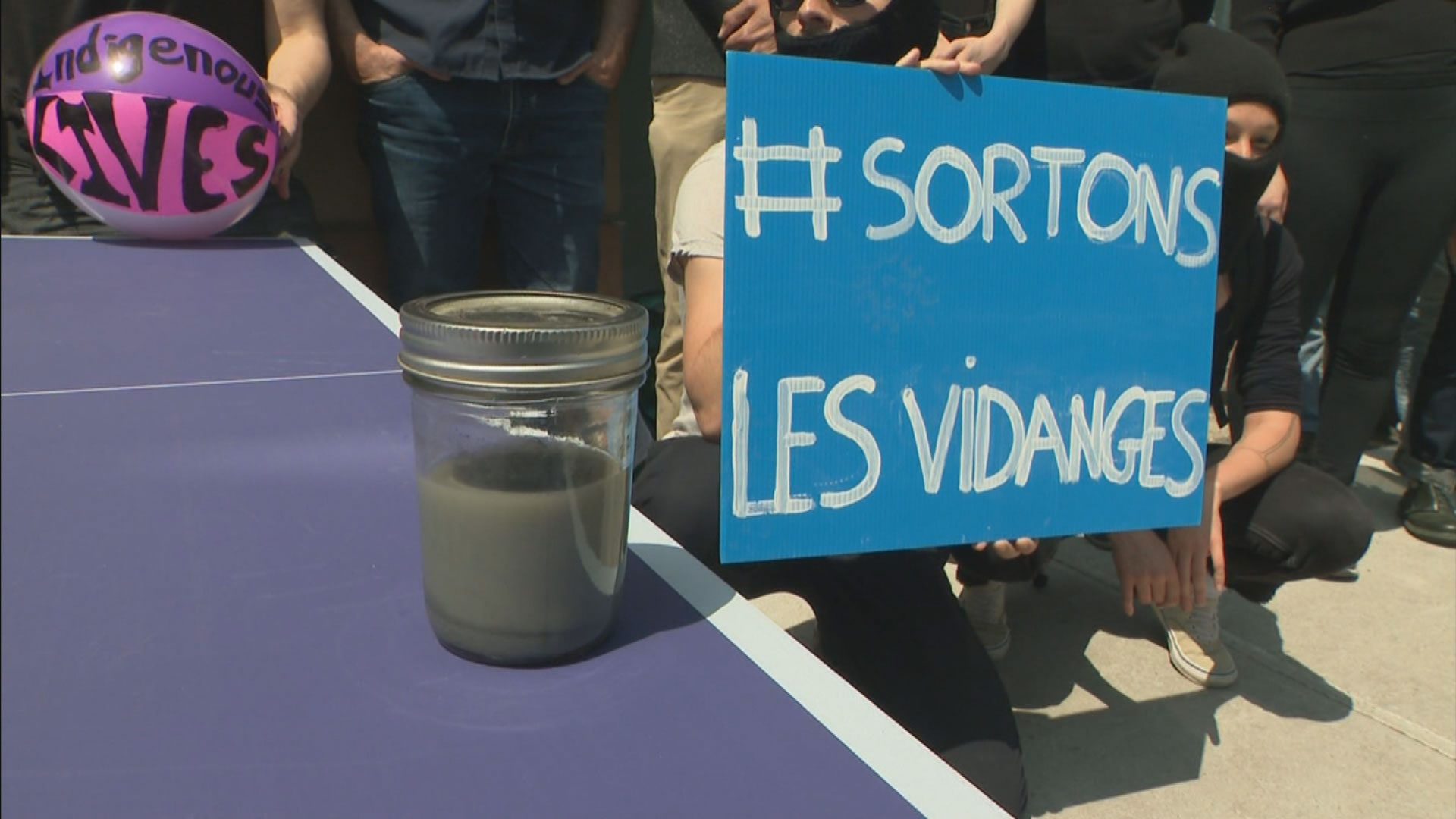A game of ping pong plays out in front of the offices of Marc Miller, minister of Crown-Indigenous relations as a form of a political statement of what is happening in Kanesatake Mohawk Territory a half-hour drive to the west of Montreal.
This is where a group is calling for an independent commission of inquiry, with the participation of the United Nations, to look into the crisis in the community.
“We remain skeptical as to whether or not this purported concern is a genuine commitment to understanding and addressing the issues we have faced as a community for over 3 decades now,” said a man who identified himself as “Blue,” the appointed spokesperson for the group here.
The others present have self-identified as Kanesatake members but aren’t speaking out on the issue of the dump over the fear of reprisals.
NDP MP Alexandre Boulerice participated in the demonstration that brought together about 25 people.
The MP brandished a container of gray and opaque water in front of the journalists, demanding a Parliamentary commission concerning the alleged toxic discharges into a watercourse adjacent to the G&R Recycling site at the northwest end of Kanesatake.
“If that’s water that we find on the ground in Kanesatake because of an illegal dump that is contaminated, no one wants to live in an environment like that,” the MP said.
The demonstrators had their faces hidden by medical masks, headbands, or masks representing the faces of Environment Minister Steven Guilbeault, Miller and Quebec Indigenous Affairs Minister Ian Lafrenière.
Blue explained that Kanesatake fears the environmental repercussions of the flow of potentially toxic water from the sorting centre G&R Recyclage, owned by brothers Robert and Gary Gabriel.
“La Presse reported that the Band Council privately admitted they felt powerless to enforce the regulations for fear of violent intimidation” and “there was no choice but to remain anonymous in this fiasco, which is the result of the apathy of all levels of government and the abandonment of Mohawk rights,” said the masked spokesperson.

Asked if he was speaking on behalf of members of the Kanesatake community, Blue answered in the affirmative.
“Here, with regard to this situation and these questions, yes,” the group’s spokesperson said.
He clarified that some female citizens of Kanesatake “are present today, they represent a group in the community” and that they are “extremely nervous about their safety.”
The group is asking for the decontamination of the G&R Recyclage site and other similar sites and a solution to ensure the safety of residents “in direct and safe consultation with members.”
The demonstrators announced on Tuesday that they were launching the campaign “let’s take out the garbage” and promised “direct actions for a month.”
G&R Recycling had its operating licence revoked by Quebec’s environment ministry in 2020.
Two years earlier, a ministry investigation had found several shortcomings and the province had requested G&R Recycling to “stop all deposits of residual materials in an unauthorized place,” to “dispose, in a place authorized to receive them, of all residual materials stored in a non-compliant manner” and to “return the lot in question to the state it was in before work began in contravention of the Environment Quality Act”.
But an investigation by La Presse last week said toxic water is flowing from the G&R sorting centre.
Federal officials have visited the G&R Recycling site in the Kanesatake community six times in the past few months. So far, these inspectors have found no evidence that the company has violated the Fisheries Act, which prohibits the discharge of harmful substances into waterways.
However, the situation worries the federal government.
Guilbeault and federal minister of Indigenous Services Patty Hajdu said in a statement that “the environmental damage to Kanesatake and the impacts on community safety are of grave concern.”
In a written statement, Hajdu’s press secretary reiterated on Tuesday that her office is “working actively with the entire federal government, including Environment and Climate Change Canada, the province of Quebec and Indigenous partners to find a permanent long-term solution.”
The minister also indicated that she met with Lafrenière last Thursday, and agreed to organize a trilateral meeting with Grand Chief Victor Bonspille “to discuss the situation and find a lasting solution to meet the needs of the community.”
Boulerice denounced what he called a “lawless zone” in Kanesatake and Blue said the “community is on its knees before the intimidation” of the owners of the site where the dump is located.
Hadju indicated that “the violence and threats against members of the Kanesatake community are unacceptable” and that in order to ensure the protection of the community, her ministry “has provided $3.2 million over four years as part of the community safety trails initiative, to respond to the need identified by the community for a specialized security team that could collaborate with the Sûreté du Québec.”
Since 2005, SQ officers have been responsible for patrolling the Aboriginal territory, but their presence has been unwelcome by the Mohawks since the Oka crisis in 1990 and they very rarely venture outside within the boundaries of the territory.
With files from the Canadian Press











